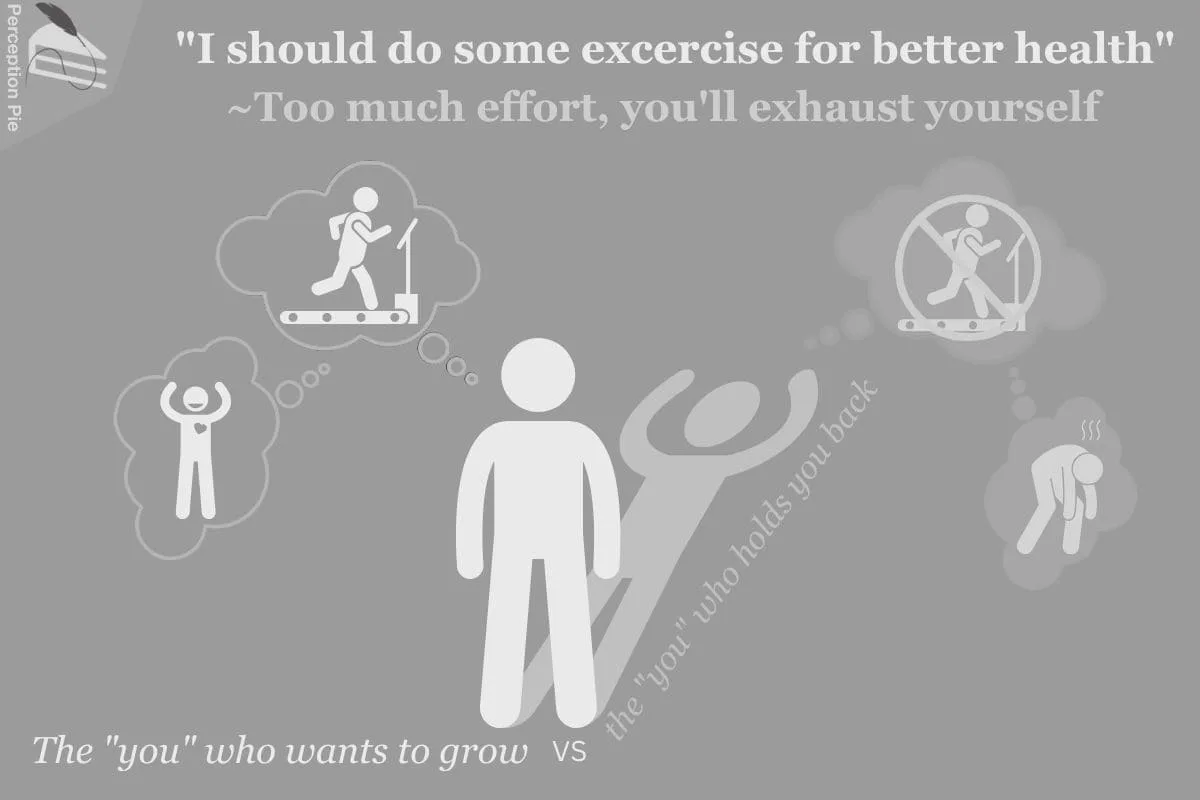
Everyday we think of things which may fulfill a desirable purpose or improve our lives, but we often don’t do them. What is holding us back from doing it?
To deal with our situations better, learn the reasoning behind why we hold ourselves back to know when we can ignore it and go for it!
Why We Hold Ourselves Back
Even after careful planning towards a new experience or the desired goal, we might find ourselves hesitating to do it. This may be called self-sabotage or simply resistance to growth.
From Psychotherapist Maria Rippo’s paper regarding self-sabotage, added with some personal observations, we find the following reasons making us hold ourselves back from working towards our goals:
Consequences of Failure
Failure is defined as the inability to meet an expectation*. Being afraid of the consequences failure will bring, is one of the main factors which makes us hold ourselves back.
Ironically, it’s also the driving force that tells us to go for it when the repercussions are little to none, which is often the case. From a simple task to something which is totally new experience, we are bound to think of the consequences of failure even if it’s done subconsciously.
Naturally, we ask “what if I fail” to ourselves before doing anything which gives us motivation to do it if there’s nothing to lose. But, for things which use resources like time, money we carefully study the consequences of failure and decide if it’s worth doing.
But more often than not, the pros always outweigh the cons. Even if there is failure in the end, it teaches us a lot.
Perception Pie is our first ever website and totally a new experience. While it was confusing try new things, new experiences certainly teach you a lot and build your perspectives of looking over things. Regardless of its success, the experience alone was worth it.
Worrying about consequences of failure is totally normal but most of the time, we have more to gain than lose from working towards our goals.
*If you were aiming to fail and you did, would it be success or failure? Let us know in the comments!
Motivation
Motivation is the desire to act for a goal, and dictates our actions towards our goals. It’s one of the deciding factor which either holds ourselves back or pushes us to keep working. Following are some factors which affect our motivation:
Is It Worth the Effort
The expected result of our goal may affect our motivation to work towards it, our motivation may see an increase if the expected result would feel worth the effort and vice versa. This is also why thinking of the benefits of our goal is a good way to stay motivated.

Self-Doubt and Self-Esteem
Self-doubt is the feeling of uncertainty towards something while self-esteem is the opposite i.e. being certain of your value. These two directly affect our motivation in a sense that If one is higher, then the other would be lower. Higher self-esteem would increase motivation while higher self-doubt would do the opposite.
Resources Availability
The availability of resources like time, money, information also has an effect on our motivation. While a person with less resources might start the race towards the goal slow, they don’t necessarily lose as long as they keep working towards the goal and stay motivated.
But, having the required resources available does give you an edge, but doesn’t decide success. At the end, motivation is key.
With enough motivation, despite multiple obstacles towards the goal whether if it’s the consequences of failure are high, resources are low
Even if the resources are low and consequences of failure high, with enough motivation, we would still continue to work towards our goal and not let anything hold us back.
The Inner Saboteur
Maria Rippo’s study suggests that a wounded part of our body called the inner saboteur, actively tries to “protect” by making us by hold ourselves back. The “wounded” part may by from anything i.e. childhood, lack of love, our false self, self-doubt etc.
Things like “I’m not good enough; I don’t belong here; I’m not lovable; I’m not acceptable and overly focusing on hiding our perceived imperfections results in self-sabotage of our desires and goals.
This is why it’s easy to keep doing what we’ve always done, as moving in the direction of growth increases resistance to change. In the end, It’s simply our survival mechanism, working hard to prevent feelings of discomfort.
This section was just some points from the study, some further details can be found in below section.
Study: Moving beyond Self-Sabotage and Resistance to Change
This section takes references from her study: Minding the Mind/Body Connection in Moving Beyond Self-Sabotage and Resistance to Change.
The study’s author, Maria Rippo, started as someone who believed she wasn’t good enough, had self-doubts, and disliked stepping out of boundaries for risks, but after her 4 yr long process of self-healing and self-realization of true-self, she successfully moved beyond self-sabotage.
She writes her journey of self-discovery from surviving to thriving and investigates the causes behind self-sabotage and resistance to change using her observations and various trusted references. Following is one of the study’s key points:
Ego & Self-Sabotage
The study author also emphasizes ego‘s role in self-sabotage. She believes that our ego represents who we think we are supposed to be, and its main concern is self-preservation and help keep us safe from harm.
Our ego believes in the story of who we’re not or who we should be but aren’t, and anything that threatens this story’s existence will create resistance and sabotage.
Psychologist Maria Rippo
Another interesting belief regarding ego which helps us understand the resistance is quoted by James Hollis, who has written numerous books on Psychology.
The human psyche is not a single, unitary, or unified thing, as the ego wants to believe. It is diverse, multiplicitous, and divided… always divided.
It is these pieces and parts of ourselves that are active at all times, that overthrow our consciousness, usurp our freedom and enact their own programs.
Psychoanalyst James Hollis
As a result, these ego parts unconsciously behave as though they are separate from the whole with the sole job is to keep us small, safe, and out of shame.
Further Study
The above portion regarding ego was one of the main points of the study. Besides this, the author writes regarding the false/true self, self-realization, the role of pain or triggers in self-healing.
She also explains how such things affect self-sabotage in great detail and how we can move from surviving to thriving. She posted her research as a project on ResearchGate, which you can visit for further study.
Conclusion
This post talked about some of the reasons why we hold ourselves back, and some advices within. We also talked further about reasons of self-sabotage using a research that is cited above.
Did you gain any new perspective of looking at this issue? Comment below and let us know!
